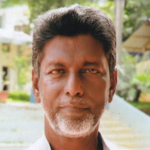TRANSLATED FROM THE MALAYALAM BY K. M. AJIR KUTTY
The day had not broken yet. The moment he got down on the platform, a cold wind welcomed him. It was the month of December. He covered his body with a shawl.
The station was deserted, and engulfed in darkness too. It seemed that no person other than him had got down there. As he was walking along the platform, he heard a question being directed at him through the darkness.
“Do you need a taxi, maash?”
He stopped. The taxi driver, whose face was still drowsy, was standing before him, smoking a cigarette. He asked him apprehensively:
“Can we go by car to Plasserry?”
“No maash, how can a car go there? Don’t we have to cross the river?”
Ignoring him, the driver walked up. He remembered somebody raising in the Assembly the issue of a bridge being built at Plasserry. That was four to five years ago. It was also heard that the Plasserry Bridge Action Committee had conducted a sit-in strike at the Collectorate.
Years ago, when he got down at the station, Nambisan had asked him, baring his thinned teeth:
“Do you have difficulty walking?”
“No difficulty at all, these legs are used to walking all over a district taking part in party processions.”
Since then he has travelled umpteen times in train through this route. On all those occasions, this tiny station, mostly deserted, would come in view. However, Nambisan alone could not be brought to mind.
The severity of coldness kept increasing, as he walked. He, who would occasionally experience the cold weather of Delhi, did not feel it so severe. Nonetheless, there was no such biting wind in Delhi. He longed to have a hot cup of tea. A small wayside tea stall was opened near the railway level-crossing some distance away from the station. Some people had gathered in front of it.
As he was sipping tea, a youth drew near, and he asked with surprise.
“Sir, where to?”
He could not give him a reply so soon. It was just then that he realized that phlegm had collected in his throat, blocking his voice. Smiling and expressing humility, as was his usual nature, he asked the youth:
“I don’t know who you are?”
“No, sir. We haven’t met in person before. I was in the Youth Federation until four years ago. Then I got a job. I’m in the Secretariat. I’m an office bearer of the Union there.”
The youth insisted on paying for his tea also. The others sipping tea there started to watch him. He would still get annoyed at being known at inopportune moments. He moved off and stood in front of a small shop mounted on short pillars that had not been opened yet. The youth also followed him. He also had a bag in his hand.
“I’d seen you in the evening at the station yesterday, sir. I thought you’d be on a journey back home. So, where’s your house?”
“My house is in Shoranur.”
“Then, what did you get down here for?”
“I want to go to Plasserry here.”
“Plasserry? Fine. That’s my village. Do you go there, sir?”
He nodded with a smile. The questioner was free to see a yes or a no in that gesture. It also had an indication that no further questions would be welcome. At press conferences, some smart journalists would intervene saying, ‘that well-known nod of yours wouldn’t do, sir, we want a clear answer.’
It was forty years ago that he had gone to Plasserry for the first time. The last visit was thirty years ago. How many times may he have gone there in the intervening ten years? He doesn’t remember. Then, after such a long intermission, why does he want to go there? He asked himself. He still had the ticket to Shoranur in his pocket.
It was as the last item on the agenda that his application for leave was taken up for discussion in the state committee meeting which lasted four days. He had applied for three months’ leave to the state committee when it met twice in the past. But his application was not considered given the complex situation prevailing in the state. It was sanctioned at the latest meeting.
“What’s the news CN? Are you planning to go on a pilgrimage?”
Someone had asked him, laughing.
Why does he need leave? It was some issues connected with his imbecile daughter that he had described in his application for leave. She must be put up in the hostel attached to the convent. She is fifteen years now. Her body is putting on weight. The changes heralding youthhood have already started appearing in her. How will she, who does not know how to wear her clothes properly, be protecting her life from now on?
His wife had not agreed to her being shifted to a convent yet. His mind was on fire, too. She was his best friend. She would go mad with delight on whatever occasional visit he made to his house.
“The people of Plasserry are still in much difficulty, sir. They have to go four miles from here. Not even an autorickshaw would go there. The ferry would not be opened before sunrise. It closes even as the sun sets. Only this train stops at this station.”
The youth said.
He remembered that it was around this time that he had got down here for the first time. That was a train coming from the north. On that day Nambisan had said:
“Let’s not wait for the sun to rise. We’ll walk. I’m more accustomed to walking in darkness.”
He laughed. It was after walking for four miles that they had reached the bank of the river. Nambisan hooted a number of times to call the attention of the ferryman. The ferry did not come. The predawn darkness was slowly disappearing. After placing his shoulder bag in the shed at the ferry, Nambisan asked:
“You have got the things for cleaning the teeth, haven’t you?”
“They must be there.”
“Then start. If you go into those bushes, you can attend call of the nature as well. How long has it been since one has gone out and sat in the open breathing clean air? Then we’ll take a bath. I’ve got Asanavilvadi herbal hair oil with me. We can save ourselves from the troubles of going through these once we are home, can’t we?”
They took a dip in the river even as it lay blissfully soaked in the falling rays of the sun. They felt the chill and shivered. Nambisan said:
“Dei, I would dream about this river when I lay wearing dirty and unwashed clothes in the jail near the pot kept for the inmates to urinate into. How many days should pass for me to come to this river to have a bath?”
“I had longed to go to the Nila River to have a bath once out of the jail. Nambisan has broken up that dream.”
“Dei, you needn’t mind it. The water flowing through this river takes its origin at a place where the medicinal plant Sataavari thrives. This water would mop up the injuries inflicted on you by them in the jail.”
“For that, what did I get by way of torture? Just strokes. Wasn’t it you, Nambisan, who, by being unnecessarily obdurate, got crushed by them like ginger?”
“When they shower their blows on me, it’s sort of comforting, da. You just lie down with your eyes closed and take the blows getting the kick of some intoxicant as it were.”
On the other bank of the river there is a makeshift teashop made of woven palm fronds. A Muslim woman was making puttu sitting in front of a fireplace on the floor there. Two children were sleeping on a mat by her side.
“O Nabeesumma, give us something. We’re quite hungry.”
“Who’s that? Nambisan? The day before yesterday I heard somebody reading from the paper that Nambisan had been released from jail. Since then the people have been waiting for you here at the ferry, and it’s now that you have come, when the dawn has just risen?”
Upon seeing a stranger with him, she drew her shawl over her face.
“Who is this, this new guy?”
“This is CN. Haven’t you heard about him? He’s Secretary of the SF in Malabar. He’s a B A (Hons.). Educated people with standing are coming to our party, aren’t they, Nabeesumma?”
“Ya, Allah…there, sit down. Will serve you your tea, just now. One boiling will do.”
He felt so small and shrank at being admired by Nambisan. Nabeesumma served them puttu and steaming channa curry on a mat spread on the floor. The tea was strong and thick. While having the breakfast to the finish, Nambisan put questions to her to get an idea of the happenings in the village during his absence.
As they were getting out of the teashop, Nambisan said:
“Add it to my account, Nabisumma. I’ll give it to you later.”
“What’s it that you’re saying, Nambisan? You people belong to our own family, don’t you?”
He saw the woman’s eyes getting filled with tears.
“The day has broken, sir. We can walk. The ferry will have opened by the time we reach there.”
Waking from thoughts, he walked with the youth. When he had walked two furlongs, he panted. Even in the cold weather, he started to sweat.
“Let me carry your bag, sir.”
The youth said. But he did not allow him to. The bag was heavy as it contained some clothes he had bought for his daughter before the start of the journey.
“Sir, you said you wanted to go to Plassery. Where do you want to go to in Plasserry?”
The youth asked.
“I just want to see Nambisan.”
“Nambisan?”
The youth was clueless about it. Trying to remember it, he asked again:
“Which Nambisan?”
“He’s known as Plasserry Narayanan Nambisan.”
“Oh, the Revolutionary Nambisan! We know him only by that appellation.”
The youth burst into laughter.
“Are you going to his place?”
He did not reply to that question. He by himself had put a stop to that conversation. His panting increased. The hand under the weight of the bag felt quite enervated. It may be years now since he had walked last like this.
The boat was there at the ferry. As he was crossing the river, he felt a little relieved. It was a silent voyage. The river was full of water. In the light of the falling rays of the sun, the river shone at certain places. Pointing to him the youth was talking to the ferryman in private.
“Nambisan is no longer the old person that he had been, sir.”
The youth said. Hearing that, the ferryman smiled.
He did not utter any word by way of answer.
As they drew near the entrance to Nambisan’s house, the youth took leave of him.
Bowing to him with folded palms, the youth said:
“When you see me next time, please remember me, sir. I am planning to go on deputation to another department. If I get it, it’ll prove to be quite advantageous to me. I’ll give you all the papers when we meet in Thiruvananthapuram.”
He nodded.
Nambisan’s old house was not there. They had demolished it except for a single room in the corner. It was covered with a screen of woven palm fronds. When he made a noise by clearing his throat, Nambisan’s wife came and opened the door for him.
It was for the first time that he had seen her. When he tried to introduce him to herself, she stopped him saying:
“No need of it at all. I know. He talks about you whenever an occasion arises. He’ll show me your photos also in the paper. Please sit down, I’m coming just now.”
He sat on the elevated platform. The newspaper of the day had arrived and was lying on the elevated platform. Four or five balsam plants were growing on the parched courtyard with signs of them being watered regularly.
The old house was a two storied building of laterite stones with a courtyard in the middle. There was a large cattle shed adjacent to the roofed gate in the front. There were a number of youngsters busy doing their work yelling at each other. The land around the house was cool and shady with coconut and areca palms growing profusely.
Nambisan’s private room was above the northern corner of the building. Upon reaching the house after being released from the jail, Nambisan had told him then:
“We won’t be accorded any ceremonial welcome or something here. Neat food will be served at its time, what else do we need? You can have a decent oil bath, read your books and jot down something and all that, okay?”
It was from the beam of the roof of the room that Nambisan had taken the key to his room on that day. Walking up to the kitchen area, he said aloud to the cook:
“Gopalan Nair, one more person will be here for a week.”
Now Nambisan’s voice could be heard from inside. He was arguing with his wife. The wife came out and called him:
“Come in.”
Upon seeing him, Nambisan burst into laughter. He was reclining in a small easy chair. His hair and beard were thick and knotted with black and grey hairs appearing in equal measure. Most of his teeth had fallen. The remaining ones were stained with nicotine. So, when he laughs with his mouth open, all that one sees is a dark emptiness. His eyes alone shone extraordinarily brilliant.
On a stool close by, there were half a bottle of liquor, a glass and water in a tiny brass pot.
“Oh, is it the leader? Come, come.”
Without uttering a word, he sat on the cot in the room.
“It’s good that you have come. Because, I have been thinking about something for two days now; I could clear the question by raising the doubt with the leader himself, couldn’t I?”
Nambisan poured liquor into the glass and took a gulp after thinning it with water.
“Why, is the leader annoyed at seeing this?”
“No.”
He said.
“This is poison; there’s no doubt about it. But people drink poison also sometimes. Now, my doubt is that…”
Nambisan continued.
“This is a complex issue. I believe that this has not been discussed in our philosophy. I am not sure whether Lenin or someone else has spoken about it. I have leafed through the books of Mahatma Gandhi. It was not there either. Now, would you object to my asking?”
“I’m not sure if our political parties are decided on this. I also don’t know if they have written a new clause into the Constitution. The leader should know what opinion his party has in this matter.”
“My party? Isn’t it our party Nambisan?”
He asked.
“Oh, leave it.”
Nambisan grew more serious. He got up from the chair. When he stood up, the dhoti he had worn loosened and fell down. Without being aware of it, he was speaking stark naked.
His wife rushed into the room from outside and had his dhoti tied around the waist properly. But he was unmindful of all that.
“What are you doing?”
“You go out, to the other side.”
Nambisan scolded his wife. He pointed his index finger at him.
“What’s the proper age for a girl to get raped? The other day I had read in the paper that a ten-year-old girl was raped. Last day it was heard that a six-year-old girl was outraged like that somewhere. If it’s done at different ages arbitrarily, there won’t be any certitude in this. So, what’s the exact age for this? Are you sure?”
Nambisan pitched his voice high. He shivered with anger. He moved one foot closer to him.
“Is there an age, I’m asking?”
He did not say anything by way of reply. He did not move from where he was sitting either. Gradually Nambisan calmed down. He sat in the chair and lit a beedi and puffed at it.
Then he said to him who was sitting motionless.
“Go off.”
Nambisan’s wife appeared at the door and said to him:
“I’ve kept water for you on the other side. Go and wash your face.”
When he came back after washing his face, she had served him some payasam (kheer) on a piece of banana leaf and had kept it on an elevated platform in the portico. There was a glass of tea as well. The payasam tasted of the sourness of chethi flowers and the tanginess of the basil leaves.”
“This is an offering given from the temple. Don’t know if it’s to your liking?”
“It’s nice.” He said. Then he asked:
“What about your children?”
“Daughter is working in a brassieres manufacturing unit. She has begun to get her wages every week now. Son is learning diamond cutting and ornament making. He was not good at studies in school.”
She spoke as if informing him that their life was more or less secured. In order to justify it she moved her lips also in a gesture of smile.
“He turns nasty occasionally like this when he drinks. Otherwise he is calm and neat.”
He hummed to that.
“You won’t be going off before having lunch, will you?”
“No, I’m going now itself.”
When he looked inside, he saw Nambisan dozing off in the chair.
Also, read Locating Postcolonial Hero In Bangla Speculative Fiction (Part I) by Debraj Moulick, published in The Antonym
Follow The Antonym’s Facebook page and Instagram account for more content and interesting updates.




























0 Comments